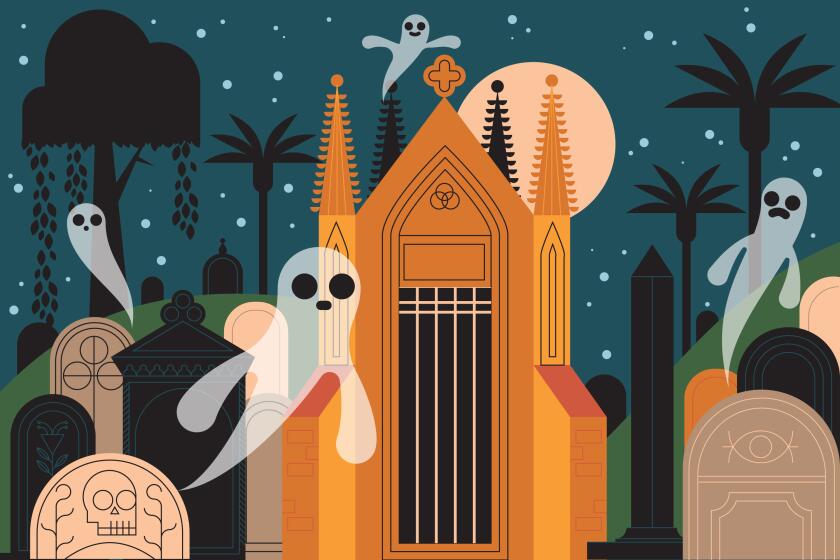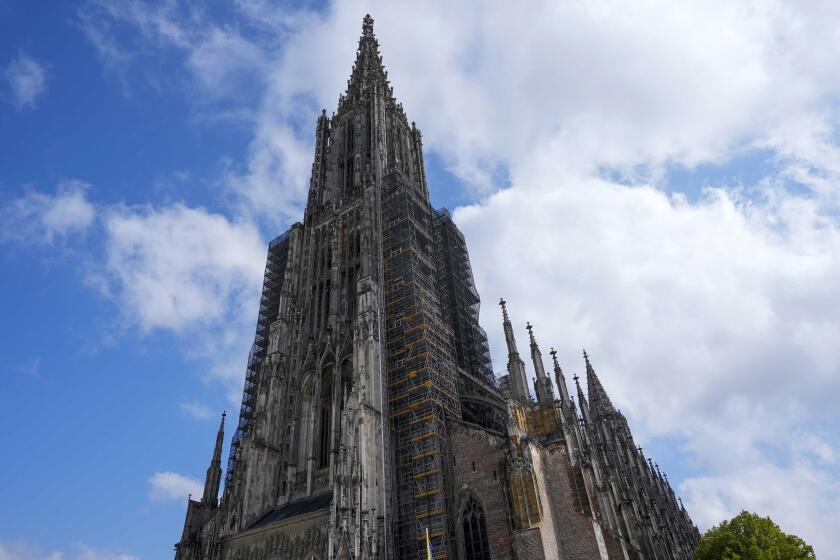East German Visitors Find Look at U.S. Enlightening : Tour: Four Presbyterians visiting Irvine congregation see a Santa Ana soup kitchen along with Disneyland and Yosemite.
Andreas Schmidt, a visitor from what was once East Germany, was impressed by the beauty of Yosemite, the size of the United States and the efficiency of a system that brings water all the way here from Northern California.
In Orange County, Schmidt was impressed by a soup kitchen in Santa Ana, where he helped serve food to the homeless.
“Last Monday, we moved from this very white, middle-class world of Irvine to Santa Ana, where we worked at the Southwest Community Center,” said Schmidt, a tool-and-die worker visiting an Irvine Presbyterian congregation this week with three other eastern Germans.
“I’ve only seen such things on television or in the movies before,” Schmidt said. “The safe distance one has when one watches television was taken away. We were there, and it became a reality for me. This combination of unemployment and homelessness--we don’t have this experience in East Germany.”
Schmidt and the other eastern Germans--pastors Lothar Alesch and Adalbert Nitzsche and teacher Elke Donnerhack--are visiting the county through the Berlin Fellowship group.
“The purpose is . . . for us to better understand each other,” said Jane Holslag, an Eastern Europe-based mission worker with the group and former associate pastor of Irvine Presbyterian Church, the group’s host agency.
Since 1964, missionaries from Berlin Fellowship have been traveling to eastern Germany in the guise of tourists, making churches their primary sightseeing targets. The four eastern Germans are the first to make the journey in the opposite direction.
“There was a wall, as you recall, the Iron Curtain, and that prevented most East Germans from traveling,” Holslag said. “Your average pastor or average lay person could not travel.”
The Germans visited a church in Oroville and spent a few days in San Francisco and Yosemite before coming to Orange County. They talked with members of the church, attended church meetings and services and went to Disneyland.
They presented the Irvine congregation on Oct. 26 with a special candle to symbolize the light of Jesus Christ that binds the world together, Alesch said.
Candles hold a special meaning for the visitors. Before the Berlin Wall came down, eastern German protesters gathered in churches to pray for a nonviolent resolution to the country’s division, then lit candles and marched in the streets, Holslag said.
In an interview Wednesday, for which Holslag served as interpreter, the visitors reflected on their impressions of the United States and recent changes in their country.
Alesch and the others said German churches are more formal and structured. Society’s attitude toward religion is different too, despite recent changes in their country, they said.
“There seems to be a greater degree of freedom to speak about your faith here,” Alesch said. “People in our part of Germany, the east part of Germany, need to learn how to speak openly about our faith. Formerly that was not something that was allowed in our society.”
Nitzsche said he was impressed by the welcome from Americans in the pews during services. When he returns to his country, he wants to encourage more active involvement by lay people in services, he said.
Since the fall of the Berlin Wall, the four said, they have seen changes in their church, which has been merged with the West German branch.
They can now advertise parish activities freely, talk about their faith and evangelize in the streets without worry of consequences.
Under Communist rule, religion was not forbidden, but it was not encouraged, either, the four said.
“There were disadvantages as a Christian,” Nitzsche said. “You may or may not have been able to complete your high school education and go on to college. But it was never said you can’t go to college because you’re a Christian. They just did it.”
Alesch had to leave for home earlier than this colleagues, but the other three will remain in the county until Monday, when they will depart for Washington to visit a friend in the capital. When they return home, they will take many memories of things they saw, heard and tasted.
“I want to take back with me that there are also problems in America,” Schmidt said. “And even in the good houses, the pretty houses, there are problems. Humanity is here, as well.”
Sign up for The Wild
We’ll help you find the best places to hike, bike and run, as well as the perfect silent spots for meditation and yoga.
You may occasionally receive promotional content from the Los Angeles Times.



